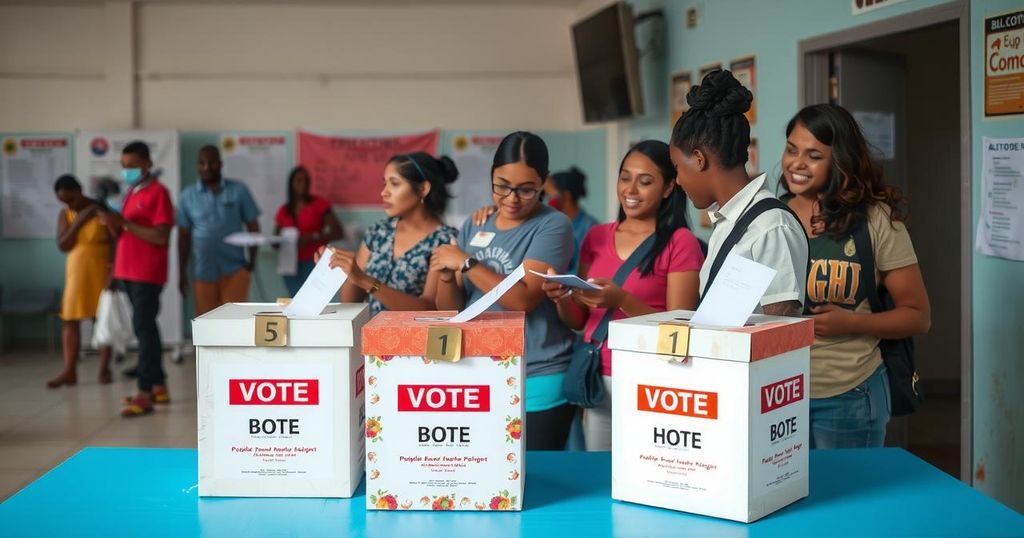World news
2024 ELECTIONS, ABDALLAH SAMBI, AFRICA, AFRICA CENTER FOR STRATEGIC STUDIES, AHMED, AP, ASSOUMANI, AZ, AZALI ASSOUMANI, COMOROS, ELECTIONS, EUROPE, FOR THE RENEWAL OF THE COMOROS, FRANCE, GOVERNANCE, GOVERNMENT, GRANDE COMORE, INDIAN OCEAN, JUWA, JUWA PARTY, MADAGASCAR, MITSOUDJE, MITSOUDJÉ, PRESIDENTIAL ELECTION, VOTER TURNOUT
Amira Khan
0 Comments
Comoros Parliamentary Election Marked by Opposition Boycott
Comoros conducted a parliamentary election on Sunday, which was boycotted by several opposition parties citing authoritarian practices under President Azali Assoumani. Approximately 330,000 residents were eligible to vote for 33 legislative seats, but low turnout is expected due to widespread discontent. Assoumani, who has faced allegations of election fraud in the past, is in his consecutive presidency after controversial changes in electoral laws.
The archipelago of Comoros held a parliamentary election on Sunday, yet several opposition factions chose to boycott the process, alleging that President Azali Assoumani and his ruling party are increasingly authoritarian, casting doubts on the election’s integrity. Voters will decide the fate of 33 legislative seats in this single-day vote, with results anticipated next week. According to the electoral commission, approximately 330,000 out of 850,000 residents are registered to cast their ballots, though opposition leaders anticipate a dismal turnout due to widespread disillusionment with the democratic procedures in place.
President Assoumani’s party, the Convention for the Renewal of the Comoros, previously secured 20 of the 24 contested seats in the 2020 parliamentary elections, a process that was criticized by opposition groups as a mere façade rather than a legitimate electoral exercise. Following a contentious electoral climate, Assoumani, who was voted in as president for a five-year term last year amidst allegations of fraud and unrest, exercised his right to vote in his home city of Mitsoudjé. One of the noteworthy opposition parties, the Juwa Party, previously headed by former President Ahmed Abdallah Sambi, also abstained from participating in both the present election and the one held in 2020.
Since its independence from France in 1975, Comoros has struggled with political instability marked by numerous military coups. Assoumani, a former military officer, originally seized control in 1999. He resigned from the presidency in 2006 but reclaimed the position through subsequent elections, including a controversial win in 2016. By amending the constitution in 2018, he circumvented term limits, an action criticized by observers such as the Africa Center for Strategic Studies, which has noted a trend of increasing political repression under his leadership. Despite adverse weather conditions posed by Tropical Cyclone Dikeledi, authorities confirmed that election activities would proceed as planned.
The current situation in Comoros arises from a long history of political turmoil, characterized by military coups and unreliable electoral practices since its independence in 1975. President Azali Assoumani, having initially seized power through a coup, has since managed to maintain governance through a series of elections that have been marred by accusations of fraud and manipulation. The political landscape is particularly fragmented, with opposition parties frequently expressing their discontent over the democratic processes, leading to boycotts of elections.
In summary, the parliamentary election in Comoros was overshadowed by a boycott from several opposition parties, raising critical concerns about the state of democracy and governance in the archipelago. With a history of political instability and suppressed democratic practices under President Assoumani, the legitimacy of the electoral process remains in question. As results are awaited, the political climate continues to reflect deep divisions and a pervasive sense of disillusionment among the populace.
Original Source: apnews.com




Post Comment